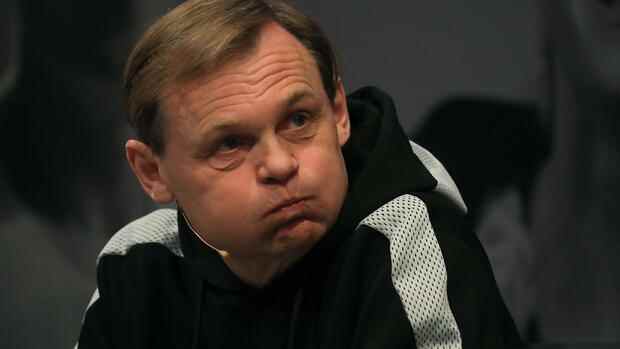Munich Kasper Rorsted leaves. With a further reduction in the forecasts and good wishes for his successor Björn Gulden, the Adidas boss said goodbye to the Dax company. Rorsted said he was happy that he was allowed to run the “iconic sports brand” when presenting his last three-month balance sheet on Wednesday. At the end of the week he is leaving the world’s second largest sporting goods company prematurely.
Gulden, who will succeed him on January 1, has done a “tremendous job” as CEO of Puma. He has known the Norwegian for a long time and wishes him the best of luck, said Rorsted. The quarterly figures were then presented by Chief Financial Officer Harm Ohlmeyer, who will temporarily lead the group in the coming weeks. The results showed that Rorsted left several open problems to his successor Gulden.
Former Henkel boss Rorsted was brought to Adidas in 2016 as a cost and process optimizer to improve the sporting goods group’s weak margins and drive growth.
He was able to celebrate successes in the first half of his tenure. In his short farewell speech, he himself pointed this out. Online sales have quintupled, and Adidas brand sales in the USA have doubled. But profit warnings and weak numbers have been dominating for some time.
Top jobs of the day
Find the best jobs now and
be notified by email.
For the current year, Adidas only expects sales growth in the low single-digit percentage range – originally Rorsted had forecast a currency-adjusted sales increase of eleven to 13 percent for 2022.
In terms of earnings, Adidas only expects a small profit from ongoing business of just 250 million euros for the year as a whole. The group had initially promised up to 1.9 billion euros.
Currency-adjusted sales in the important market collapsed by 27 percent.
(Photo: Bloomberg)
Many causes are external, from Corona to the Ukraine war, says an Adidas insider. But it’s like football: “If you don’t succeed, at some point the only thing left is a change.”
2. Drop in sales in the important market of China
The new Adidas boss will be measured in particular by whether he succeeds in turning the tide in China. Adidas had a particularly strong position here. A further expansion was a central component of Rorsted’s medium-term strategy “Own the Game”.
But “the trend in terms of customer traffic in China” has continued to deteriorate, as Ohlmeyer put it. In concrete terms, this means that sales in the important Chinese market collapsed again in the third quarter by 27 percent after currency adjustments.
All major suppliers there are suffering from Covid restrictions and a boycott of western brands. But Rorsted admitted in an interview with the Handelsblatt: “Of course we made mistakes in China.”
At times, Adidas did not have the right products in stock for the market. “We weren’t good enough at understanding consumers,” Rorsted put it. Local buyers, for example, wanted a “Chinese touch”.
3. The brand has lost its radiance
But Adidas’ problems lie deeper. “The market says: Nike and Puma currently have a greater brand heat,” criticized Thomas Jökel, fund manager at Union Investment. In his opinion, the brand strength of Adidas has suffered.
One reason for this, according to industry experts and investors: insufficient innovative strength. “The share of new products in sales has gradually fallen in recent years,” said Ingo Speich, who is in charge of corporate governance and sustainability at Deka.
Even at Henkel, Rorsted had the reputation of paying particular attention to costs and margins at the expense of innovative strength. But that, says an Adidas manager, doesn’t do the Dane justice. He spent more on new products and, for example, signed more football teams to strengthen the brand. In any case, there is no doubt about Rorsted’s enthusiasm for sports, who was regularly to be found in the company’s fitness studio.
Rorsted himself had emphasized in an interview with the Handelsblatt that he knew that in the sporting goods industry – unlike Henkel in the consumer goods industry – you earn money through growth. “We have the largest marketing budget of all and have significantly increased investment in innovation.”
But the sales figures speak against Rorsted. In the third quarter, Adidas sales increased by only four percent, adjusted for currency effects, to 6.4 billion euros. Challenger Puma increased sales by 17 percent to a record 2.35 billion euros. In the past year, the competition had grown significantly stronger in some cases.
An additional problem for Adidas is the termination of the cooperation with Kanye West. In good years, this cooperation alone brought in well over a billion euros in sales. These revenues are now missing, the reduction in the sales forecast was also due to this.
In addition, Adidas’ reputation may have suffered. The group ended its cooperation with West after his anti-Semitic outbursts under massive public pressure.
4. The internal mood has suffered
Internally, too, a lot of work awaits the new boss. Important managers had left the company under Rorsted’s leadership, and some insiders complained about the rough tone.
Rorsted himself did not recognize himself in the allegations. “I do have the impression that the majority of employees here are very happy to come to work,” he said shortly before announcing his departure.
Nevertheless, industry experts assume that the internal mood will improve under Gulden’s leadership. The family feeling that dominates at Puma is also largely his merit, says a Puma manager. “He’s the same internally as he appears to the outside world: open and honest.”
A personnel consultant also thinks that Gulden is an ideal candidate in the current situation. He is “clever, but authentic.” His friendly manner is just as popular with employees as it is with specialist dealers and investors.
More: Change perfect: Puma boss Björn Gulden will lead Adidas in the future
